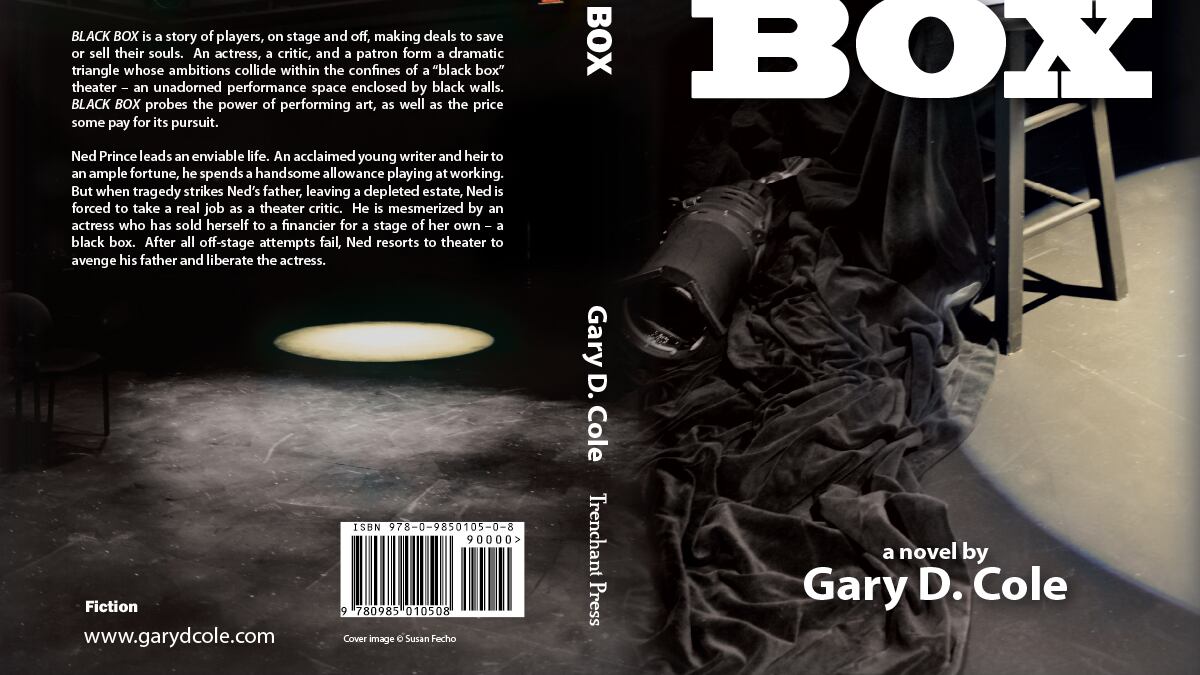Gary D. Cole says that Poona the Fuckdog and Straight cost him a job at the National Endowment for the Arts. The two plays—which were filmed by StageDirect, a company that Cole founded—apparently caught the disapproving eyes of the NEA and the White House during George W. Bush's presidency, ending Cole's pursuit of a position at the government agency.
"That, as you can imagine, was very traumatic," Cole says. "That's sort of what got me writing."
Today, writing is once again Cole's weapon against trauma. He planned to raise money for CoHo Productions, which he co-founded in 1995, by offering copies of his 2012 novel, Black Box—a Portland-set tale of intrigue—for a suggested donation. After COVID-19 struck, Cole reconceived the book as a multipart virtual event called Black Box: Page to Stage and chose to do an in-person premiere for the media.
"Honestly, there is still trepidation," Cole says of the decision to hold a live event during the pandemic. "I'm not going to pretend that there's not. But our feeling was that this is what we can do and we want to do it, rather than just sitting around going, 'Woe is us.'"
Black Box—a collaboration among Cole, videographer Robert Randall, and CoHo's producing artistic director, Philip Cuomo—chronicles the relationship between Ned Prince (James Luster), a theater critic, and Karin Bergren (Marcella Laasch), an actress. While Cole now lives in North Carolina, the novel was inspired by his Portland years. The story includes a CoHo-like theater and stems partly from Cole's fascination with Steffen Silvis, the notorious WW theater critic who was laid off in 2005.
Being in Black Box meant adhering to strict physical distancing protocol—Luster and Laasch's rehearsals were restricted mostly to Zoom and a park in Vancouver, Wash.
"In one of the scenes, she's supposed to touch him, and it's like, 'Can't really do that,'" Laasch says. No difficulty, however, could diminish her enthusiasm for the play. "I am hungry to be in front of an audience. With everything that's going on and not being able to act, it's very frustrating."
The spirit of COVID-era innovation also extended to the technical side of the production. Black Box unfolds in four scenes that will be released separately online, along with talkbacks featuring the show's creative team, and features a minimal set.
"Our sense was that it was more important to get this campaign underway than to have high-grade production values," Cole explains, adding that locations will be evoked with simple details, like cocktail glasses for a scene at the Hilton and place settings that are meant to suggest the Black Rabbit Restaurant at McMenamins Edgefield.
If Black Box's blending of the real and the virtual triumphs, it could deliver hope for theaters whose appetite for performance hasn't been sated by audio plays and Zoom readings. Yet while Cole has confidence in the anti-coronavirus measures that will be imposed during the premiere (seats will be assigned, only one person at a time will be allowed in restrooms and everyone except for the actors will wear masks), he admits the play could still end up being an online-only event.
"We recognize that these are uncharted waters," Cole said July 16. "It's still possible, if things go south between now and a week from tomorrow, we may call [the premiere] off."
Challenges don't typically daunt Cole—they often inspire him to adapt. After the NEA turned him down, he rebounded partly by writing a memoir. While working as a lawyer for the CIA, he kept his artistic streak alive by appearing in plays (including The Lion in Winter and Tartuffe). And when he grew disillusioned with the Republican Party, he registered as an independent
"It's one thing to be a party of limited government, but it should be competent limited government, and that's not what we're getting now," Cole says of the Trump administration.
So it's no shock that Cole is fighting to keep theater alive while COVID-19 rages, as 75% of Black Box's sales will go to the Oregon Arts and Cultural Recovery Program.
"This is nothing like having a real run of a play," he says. "It's a shadow of that. But if shadows are as much as we can do right now, then that's what we should do."
SEE IT: Black Box's world premiere for media representatives will take place Friday, July 24, at CoHo Theater. The first scene will be available online Friday, July 31, through Friday, Sept. 4.
